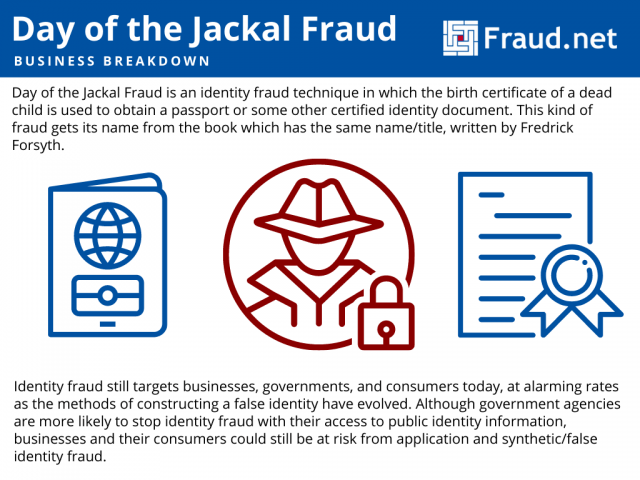What is Day of the Jackal Fraud?
Day of the Jackal Fraud is an identity fraud technique in which the birth certificate of a dead child is used to obtain a passport or some other certified identity document. This kind of fraud gets its name from the book which has the same name/title, written by Fredrick Forsyth. Day of the Jackal Fraud dwindled after the UK cracked down on the crime in the mid to late 2000s.
Day of the Jackal by Fredrick Forsyth vs. Day of the Jackal Fraud
The book centers around a professional assassin contracted by a French paramilitary organization conspiring against Charles de Gaulle, the president of France. The assassin is unique in that his true identity is always unknown, codenamed “The Jackal,” who acquires a legitimate British passport using the name of a deceased man. The Jackal specifically searches graveyards to find the headstone of a child who, if he had not died, would be roughly the same age as him. Then, he buys a copy of that child’s birth certificate and applies for a passport, now possessing a new identity to carry out his mission.
The recognized crime “day of the jackal fraud” operates in the same manner as The Jackal’s instance of identity fraud. Fraudsters apply for a passport under a false name, usually someone deceased and one without much of a history. Once they have that passport, they effectively have a new identity with which they cannot be tracked.
How Prevalent Is It?
In 2003, BBC reported that around 1,500 possibly fraudulent passports were being granted in the UK each year, although the actual number may be higher. In any case, identity fraud including Day of the Jackal fraud cost the government 1.3B GBP per year around 2003, until records transitioned to a computer database that could more easily flag names of the deceased being used for passport identity fraud by cross-referencing names with the Office for National Statistics (ONS).
In 2007, the United Kingdom Identity and Passport Service (IPS) uncovered about 1,200 cases of passport applications using identities of deceased people, and stopped 700 new fraudulent applications, virtually ruling out this type of fraud with “Operation Wisdom”, launched in 2004. Since 2007, there are only rare cases of day of the jackal fraud attempts – it is now virtually insignificant in the UK, although other countries that lack record digitization or automated security may still face this problem today.
Why Is This Important?
Day of the Jackal Fraud is a form of identity fraud and application fraud – identity fraud still targets businesses, governments, and consumers today, at alarming rates as the methods of constructing a false identity have evolved. Although government agencies are more likely to stop identity fraud with their access to public identity information, businesses and their consumers could still be at risk from application and synthetic/false identity fraud.
Learn more:
- Definition – False Identity Fraud
- Blog – What is Synthetic Identity Fraud?
- Blog – Synthetic Identity Fraud is Proving to Be Challenging and Stealthy
- Blog – Top 7 Steps for Preventing Loan Application Fraud
Contact Fraud.net for recommendations for fighting application and identity fraud and a free demo of our products.





